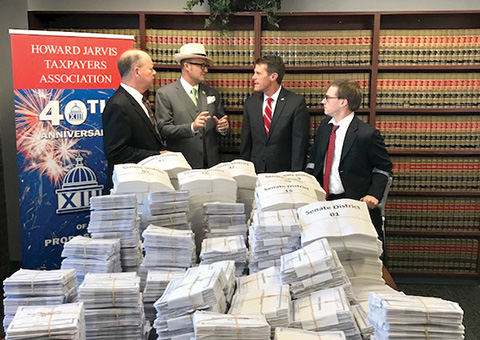
UNDER THE DOME: HJTA DEFENDS PROP. 13, FIGHTS TAX INCREASES
As I write this column, the Legislature is in the midst of their monthlong summer recess. It is abnormally quiet. There are not a lot of meetings, no bills are being heard, and taxpayers are not having any more dollars pilfered from their wallets. But the reprieve will be short-lived, as the Legislature returns for one final flurry of activity before lawmakers adjourn for the year on August 31 and return to their districts to prepare for the November elections.
What has made this legislative year different is the fact that no tax increase proposals have passed through the Legislature. Last year, Republicans and Democrats alike were complicit in jamming three separate tax increases and fuel-cost hikes into law. They renewed the cap-and-trade program, continuing a multi-billion-dollar increase in fuel costs that brings in state revenue to fund high-speed rail. They invented a new tax on recorded documents that is supposed to fund affordable housing. And the SB 1 gas and car tax increase was said to be needed to fund road repair, even though billions of dollars have been diverted away from maintenance over the last decade. In the midst of an $8 billion surplus and a record $130 billion budget, Sacramento was steadily increasing taxes.
It is rare that this column is able to be the herald of good news. Despite my vigorous attempts to find a silver lining for each article, this effort often proves difficult because the Legislature is so out of touch with average taxpayers. Fortunately, 2018 hasn’t been as dreadful for taxpayers as 2017, starting with the fact that Proposition 13 has been successfully protected, so far, from several serious threats.
A new amendment introduced in 2018, Senate Constitutional Amendment 22 (SCA 22) by Senator Ben Allen, D-Los Angeles, would lower Proposition 13’s required two-thirds vote for the approval of local parcel taxes to 55 percent if the taxes were for education. Maintaining the two-thirds vote for education parcel taxes is important to protect property owners. While everyone gets to vote on the imposition of a parcel tax, only property owners pay them. Parcel taxes are also extremely regressive in that all property owners pay the same tax regardless of the size of the home or business. Thankfully, SCA 22 has stalled in the Senate. The same is true for SCA 6 by San Francisco Democrat Scott Weiner, who proposes lowering the two-thirds vote for both sales and parcel taxes in order to pay for local transportation infrastructure projects.
SCA 22 and SCA 6 can only move forward if they receive a two-thirds vote in the Legislature, and the June recall of former Orange County Senator Josh Newman has resulted in the Democrats losing their two-thirds supermajority in the Senate. While that is not a sure-fire guarantee that Proposition 13 will be protected, it makes it far more likely that these two bills will not succeed.
Although no tax increase proposals have been approved by the Legislature this year as of this writing, that doesn’t mean that they haven’t been introduced. Any and all of them could come up for a vote before the Legislature adjourns on August 31. Here’s a list:
Assembly Constitutional Amendment 2 would restore a “snack tax” that voters rejected 20 years ago after the Legislature imposed it. The billion-dollar tax increase is particularly arbitrary. Granola would not be taxed but granola bars would be. And bottled water would be a “snack” subject to the tax as well.
Senate Bill 794 would impose a new three percent tax on fireworks at the point of sale. The abuse of illegal fireworks is a matter of statewide concern, and the Legislature could spend existing General Fund revenues on enforcement and safety programs. Instead, by taxing the sale of fireworks, Sacramento would be hurting all the nonprofit organizations that raise a sizable share of their annual revenue from fireworks stands.
Assembly Bill 2497 would impose an as-yet-undefined tax on guns and ammunition to fund school resource counselors and police officers.
AB 2303 and AB 2560 would create a new tax of up to 10 percent on small business vendors who contract out either with private prisons or with the California Department of Corrections.
Senate Bill 623 would establish a precedent-setting tax on residential water use. For now, local water agencies have joined with taxpayer advocates to vigorously fight this levy. While various areas of California do have trouble gaining access to clean water, there are numerous ways that funding can be provided using existing revenues instead of increasing taxes.
Assembly Bill 2486 would impose a $100 million tax on opioid manufacturers and distributors to fund prevention and treatment programs. Ultimately, this tax will be passed on to consumers, especially to patients who use opioids appropriately to manage pain. As an issue of statewide concern as well as a legitimate public health issue, opioid treatment should also be financed out of the General Fund.
Senate Bill 993 is the latest version of a proposal to extend the sales tax to services, generating $100 billion in new tax revenue that would be lifted from the wallets of consumers. And Senate Bill 562 would impose an even larger tax, over $200 billion, to establish a single-payer health insurance program that would effectively make private health insurance illegal in California.
In the next issue of Taxing Times, I’ll provide a summary of the legislative year and we will publish our 2018 legislative report card. It remains a pleasure to serve you in the California State Capitol.
HJTA.org is your source for everything Proposition 13 and for information valuable to California taxpayers. For more information or to take action, go to HJTA.org/take-action.
To see all of the HJTA PAC endorsements and ballot recommendations for the November 6 election, go to HJTA.org/taxing-times/endorsements-and-ballot-measure-recommendations.
Published by the Howard Jarvis Taxpayers Association (HJTA). Copyright © 2018 by Howard Jarvis Taxpayers Association. All rights reserved.

